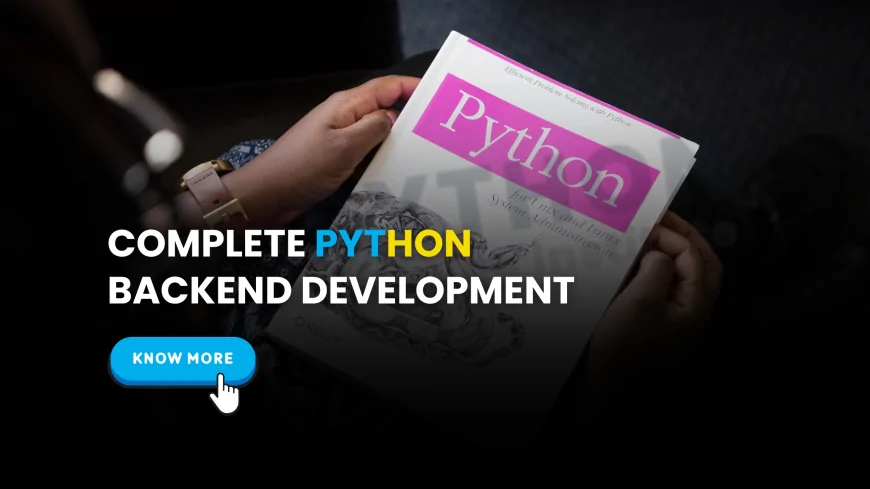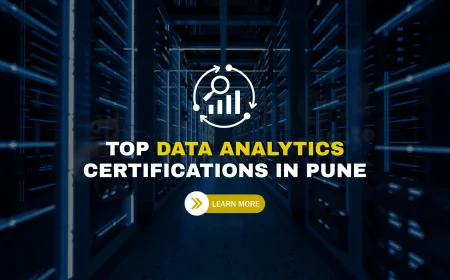Complete Backend Development Using Python in Pune | Complete Python Backend Certification Course in Pune
Master complete backend development using Python in Pune. Learn Django, Flask, APIs, databases, deployment, and get job-ready skills with expert training.

Table of Contents
- Overview of Backend Development with Python
- Why Choose Python for Backend?
- Skills You Will Learn
- Top Python Backend Frameworks
- Project-Based Learning
- Key Tools & Technologies
- Who Should Take This Course?
- Course Curriculum
- Certification and Assessments
- Placement & Career Support
- Top Training Institutes in Pune
- Course Fees and Duration
- Online vs Offline Options
- Internships and Live Projects
- Benefits of Backend Development with Python
- Career Opportunities After Completion
- Student Testimonials
- FAQs
- Conclusion
Overview of Backend Development with Python
Backend development refers to server-side logic, database handling, user authentication, and APIs that power web applications. Python is one of the most preferred languages for backend development due to its simplicity, extensive libraries, and frameworks like Django and Flask.
Why Choose Python for Backend?
- Simple and readable syntax for rapid development
- Robust frameworks like Django and Flask
- Built-in support for REST APIs, ORM, and testing
- Large ecosystem and community support
- Integrates easily with databases and cloud platforms
Skills You Will Learn
- RESTful API development
- Authentication and Authorization (JWT, OAuth)
- Database modeling and queries (SQL & ORM)
- Web server deployment using Gunicorn, Nginx
- Version control using Git and GitHub
- Unit testing, CI/CD, and cloud deployment
Top Python Backend Frameworks
- Django: Full-featured, batteries-included backend framework
- Flask: Lightweight and flexible micro-framework
- FastAPI: High-performance API framework using Python 3.7+
Project-Based Learning
You will build real-world backend systems, such as:
- Blog API with user roles and permissions
- Online bookstore backend with cart & checkout logic
- Student Management System with authentication
- API backend for a job portal with PostgreSQL
Key Tools & Technologies
- PostgreSQL, MySQL, SQLite
- JWT, OAuth2 for auth
- Docker for containerization
- Git, GitHub for version control
- Postman for API testing
- Heroku, AWS, Render for deployment
Who Should Take This Course?
- College students interested in backend development
- Freshers seeking a career as a Python backend developer
- Front-end developers looking to become full-stack
- Professionals switching to web/backend roles
Course Curriculum
A standard backend development course with Python includes:
- Python Basics (variables, control structures, functions)
- Object-Oriented Programming
- Database Fundamentals (CRUD, joins, indexes)
- RESTful API Development (Flask/Django)
- User Authentication and Middleware
- Testing with Pytest/UnitTest
- Deployment and Monitoring
Certification and Assessments
Upon successful project submissions and assessments, learners receive a certification that can be added to resumes, LinkedIn, and GitHub profiles.
Placement & Career Support
- Resume preparation sessions
- Mock interviews and aptitude training
- Live project showcases for employers
- Job referrals and hiring partner interviews
Top Training Institutes in Pune
1. Python Programming Certification Bootcamp
-
Format: Weekend and evening live classes (online & in‑person)
-
Curriculum spans Python fundamentals to advanced topics—data structures, OOP, Flask/Django web modules, scripting, debugging, and REST API creation
-
Training style: Live projects & case studies, small batches, instructor-led sessions with real-time doubt resolution
-
Placement Assistance: Resume-building, mock interviews, job referrals, and certification support—over 1,500+ placements in past year
2. Python Full-Stack Developer Course
-
Format: Flexible—choose full-time, part-time, online or classroom delivery; weekend batches available
-
Covered stack: Front‑end (HTML, CSS, JS, React), Back‑end (Python, Flask, Django), Databases (MySQL/MongoDB), Containers (Docker), Deployment (Heroku)
-
Highlights: Build real-world projects (e‑commerce apps, blogs, task managers); practical, job-aligned learning with full stack exposure
3. Industrial “Zero to Hero” Training & Internship
-
Perfect for: Engineering students and professionals aiming for hands-on industrial experience
-
Duration: Flexible from 6 weeks to 6 months, includes Python and mentions additional topics like DevOps, AWS
-
Offerings: Work on live projects under mentor guidance; get internship certificate and lab experience
Key Strengths of WebAsha Pune
-
Seasoned Trainers: Instructors with real-world experience working at top firms like IBM, Vodafone, Nokia, Capgemini—12+ years industry practice
-
Small, Interactive Batches: Personalized attention, hands-on mentoring, and real-time doubt clearance
-
Flexible Scheduling: Weekend/evening, online or classroom—suitable for working professionals
-
Strong Placement Network: Dedicated placement cell, resume aid, mock interviews, tie-ups with MNCs—high placement volume (1,500+ in a year)
Program Comparison
| Course | Duration | Format | Strongest Features |
|---|---|---|---|
| Python Certification Bootcamp | ~8–12 weeks | Weekend/Evening Hybrid | Core Python + placement support |
| Python Full-Stack Course | 3–6 months | Online/In‑person, Any-time | Build full-stack projects, deployment exposure |
| Zero to Hero Industrial Program | 6 weeks – 6 months | Intensive Internship | Live project experience + certification |
Recommendation
-
Choose Python Certification for building fundamentals & quick job readiness.
-
Opt for the Full‑Stack Course if interested in end-to-end development with front-end skills.
-
Go for the Industrial Program to gain real-world project and internship exposure.
Course Fees and Duration
Typical backend courses in Pune cost between ₹15,000 to ₹40,000. Duration ranges from:
- 4–6 weeks (fast track)
- 8–12 weeks (part-time weekend)
- 16 weeks (advanced project + placement support)
Online vs Offline Options
Most institutes offer:
- Offline batches: Great for live feedback, peer learning
- Online classes: Ideal for working professionals, with recordings and live Q&A
Internships and Live Projects
Some institutes offer internship opportunities post course, helping learners gain experience working on client-based or startup projects.
Benefits of Backend Development with Python
- High demand in the job market
- Strong career progression path
- Opportunity to work in remote and global teams
- Python backend knowledge is transferable to APIs, ML, DevOps, and cloud roles
Career Opportunities After Completion
- Python Backend Developer
- Web Developer (Backend)
- API Engineer
- Full-Stack Developer
- Django Developer
Student Testimonials
"The backend bootcamp at WebAsha taught me how to build production-ready APIs and deploy them on Heroku. I got hired within 2 months."
– Nikhil B., Backend Intern at IT startup
"I was stuck in a testing role. This course helped me switch to backend development with Django and get placed in Infosys."
– Swati R., Python Developer
Frequently Asked Questions (FAQs)
1. What is backend development using Python?
It involves building server-side logic, APIs, and database integration for web and mobile applications using Python.
2. Do I need prior coding knowledge to join?
No, most courses start from basics and gradually build up to advanced backend topics.
3. Which framework should I learn first: Django or Flask?
Flask is great for beginners; Django is better for full-featured, production-grade apps.
4. Is Python good for backend jobs?
Yes, Python is widely used in backend development across startups and enterprises.
5. What projects will I build?
Projects include REST APIs, blog apps, authentication systems, and CRUD apps.
6. What’s the typical salary after completing this course?
Freshers earn ₹3–6 LPA; experienced developers may earn ₹8–15 LPA or more.
7. Are certificates provided?
Yes, most institutes provide recognized course completion certificates.
8. Can I take the course online?
Yes, most institutes in Pune offer online live and hybrid formats.
9. What tools will I use?
Postman, GitHub, Flask, Django, MySQL/PostgreSQL, Docker, and cloud platforms.
10. Will I get job support?
Yes, many courses offer placement assistance, resume help, and interview prep.
11. Can this course help me become a full-stack developer?
Yes, when combined with front-end skills (HTML, CSS, JS), it completes full-stack training.
12. Are these bootcamps industry-relevant?
Yes, they are updated regularly based on current backend tech and hiring trends.
13. What kind of companies hire Python backend developers?
Startups, IT service companies, product companies, fintech, edtech, and e-commerce firms.
14. How do I showcase my backend skills?
By building and hosting projects on GitHub, creating portfolios, and contributing to open source.
15. How long will it take to become job-ready?
Typically 8 to 12 weeks with consistent learning and project work.
16. Will I learn deployment too?
Yes, deployment using Heroku, AWS, or DigitalOcean is part of many courses.
17. Is backend with Python better than PHP or Node.js?
Python offers cleaner syntax, strong libraries, and broader career flexibility.
18. Can non-IT professionals learn backend Python?
Absolutely. Many courses are designed to train from scratch and are beginner-friendly.
19. What is the difference between REST and GraphQL?
REST is resource-based API design, while GraphQL is query-based and more flexible in some use cases.
20. Are internships available after the course?
Yes, many institutes offer internship opportunities to help you gain work experience.
Conclusion
If you're looking to master server-side development, build job-ready API skills, and break into the tech industry, enrolling in a Complete Backend Development Using Python course in Pune is the ideal step forward. With live projects, expert guidance, and placement support, these backend bootcamps can transform your career and help you stand out in today’s competitive tech landscape.
What's Your Reaction?
 Like
0
Like
0
 Dislike
0
Dislike
0
 Love
0
Love
0
 Funny
0
Funny
0
 Angry
0
Angry
0
 Sad
0
Sad
0
 Wow
0
Wow
0















